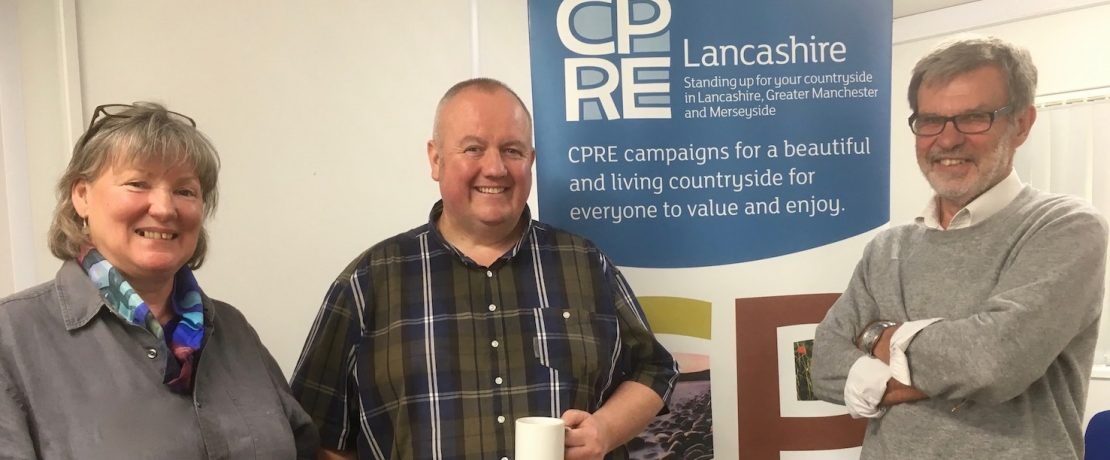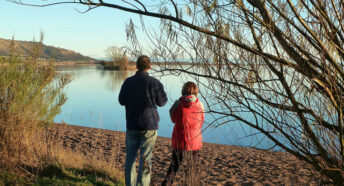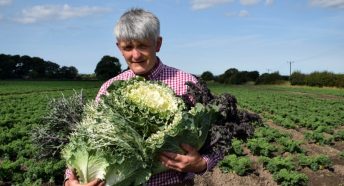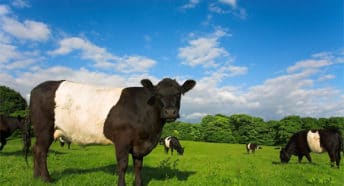Meet our patron, Stephen Lowe
CPRE Lancashire, Liverpool City Region and Greater Manchester is delighted that BBC Radio Lancashire presenter Stephen Lowe has agreed to be a Patron of our charity! Born in Accrington, Stephen and his wife Freda have two sons, Thomas (25) who works in Leeds as a software developer, and Oliver (11), who loves cricket and all things outdoors! Stephen filled us in on his career to date, the origins of his love for Lancashire’s countryside, and being the first Myerscough YTS student to be made a Fellow of the College.
Q: Have you always loved getting out and about in the Lancashire countryside?
A: I studied Horticulture at Myerscough College (Winmarleigh site) on a YTS course in 1989 before moving onto do a City and Guilds course at Newton Rigg College in Cumbria. At the age of 16 I left home to live in a caravan and work on a countryside estate in the hills above Garstang called Barnacre. Employed on the estate as a trainee woodsman, it was here that my love of all things outdoors developed. I thinned woodlands, planted trees, dug ditches, erected fences, learned how to lay hedges, and carried out all the other tasks required in the woods on an estate. The ‘grand folk’ on the estate became like a second family for me and the whole experience taught me the value of rural communities.
Barnacre was sold when I was 21 and I had to look for a new job. My life took a very different path as I worked my way up through the ranks of Fountain Forestry from sub-contractor to senior management. Working for Fountains I planted trees across the country in various locations from open cast mine reclamation sites to establishing new urban woodlands. I would estimate that I’ve planted more than 500,000 trees during my time at Fountains and I am very proud that these are now woodlands that I enjoy visiting with my family.
I have now been working in the Arboricultural sector for thirty years, and I am currently employed as an Environment Manager, managing a team of Ecologists, Arborists and Environmental Specialists working across the country. I am immensely proud to have reached a position where I can directly influence the safety of workers and create a better understanding of biodiversity and the importance of habitat connectivity.
Q How does your arboricultural work fit with your role as a BBC Radio presenter?
In 2006 I won a competition on BBC Radio Lancashire to present a one-off show on the radio. They liked the show I produced, they asked me back and I have been there ever since! So alongside my Monday-Friday arboriculture role, I present “Lancashire Outdoors” every Sunday between 12 and 2. The programme is an outside broadcast which changes location every week and reports on all things concerning the great outdoors in Lancashire. We liken it to Countryfile on the radio.
Q Are you involved with any other charitable groups in Lancashire?
In 2013 I became an environmental judge for the RHS Britain in Bloom competition. This I see as fantastic opportunity to share great ideas and best practice from group to group across the northwest and to engage with youngsters who join the bloomers to learn new skills. I was made an Honorary Fellow of Myerscough College in 2014 for my work in promoting the rural communities and commerce of Lancashire, I am the first college YTS to make Fellow!
I have been an Ambassador for East Lancashire Scouts since 2014, I love spreading the scouting message across the county and cross-pollinating good practice amongst the groups. The scout group of which I am Chairman in Oswaldtwistle were proud to be receive the Queen’s Voluntary Award in 2019. And in 2016 I was given the honour of being asked to be the finals judge for Lancashire’s Best Kept Village. This was one of the most difficult roles I have been asked to carry out as the standard of the entries was very high indeed.
Q: Finally, how do you think that your work as an Environmental Manager at Network Rail will this fit with your role as a CPRE patron?
A: In this role I oversee a team of 17 arboriculturists and ecologists working for Network Rail along the West Coast Mainline. As you can imagine, safety is of paramount importance and sometimes there is no alternative to felling trees – but if managed correctly this can actually be positive for nature and biodiversity. For example, at the moment I’m working on a project to improve the habitat for Natterjack Toads inhabiting an SSSI. This involves some clearance to make the environment more suitable.
Providing wildlife corridors and connecting habitats is also one of the key considerations in our conservation work; we prioritise improving biodiversity and accommodating a range of different habitats as well as woodland, such as species-rich grassland which is vital to support bees, butterflies and other invertebrates. Network Rail is also responsible for managing a number of SSSIs. It can be very emotive when trees are cut down, and because of this it’s really important that all the key organisations are talking to each other, so all sides have a better understanding of the issues, and can work together to find the best solutions. In my new role as a CPRE patron, I can also look to share CPRE’s perspective with Network Rail, and help the various teams connect on any planning issues that might arise.
Proper management is also essential for ensuring that woodland thrives and continues to provide a wide range of habitats for the creatures that inhabit it. I’m proud of the work I’ve done both in clearances and planting – and I have certainly planted more trees than I’ve felled! I know that CPRE supports my aspiration of making people more aware of our wonderful countryside – and the charity recognises the importance of increasing the proportion of journeys made by train and decreasing car use, which I strongly support. Nationally I would like to see much more strategic, long-term planning for the planting and management of new woodland – we need more trees in the right places. And lastly, I would like to see more conversations taking place to explain the importance of managing woodlands for diversity, to explain the purpose of traditional methods such as coppicing and their environmental benefits, and to see more people getting out into nature, supporting rural businesses and experiencing Lancashire’s wonderful countryside.







